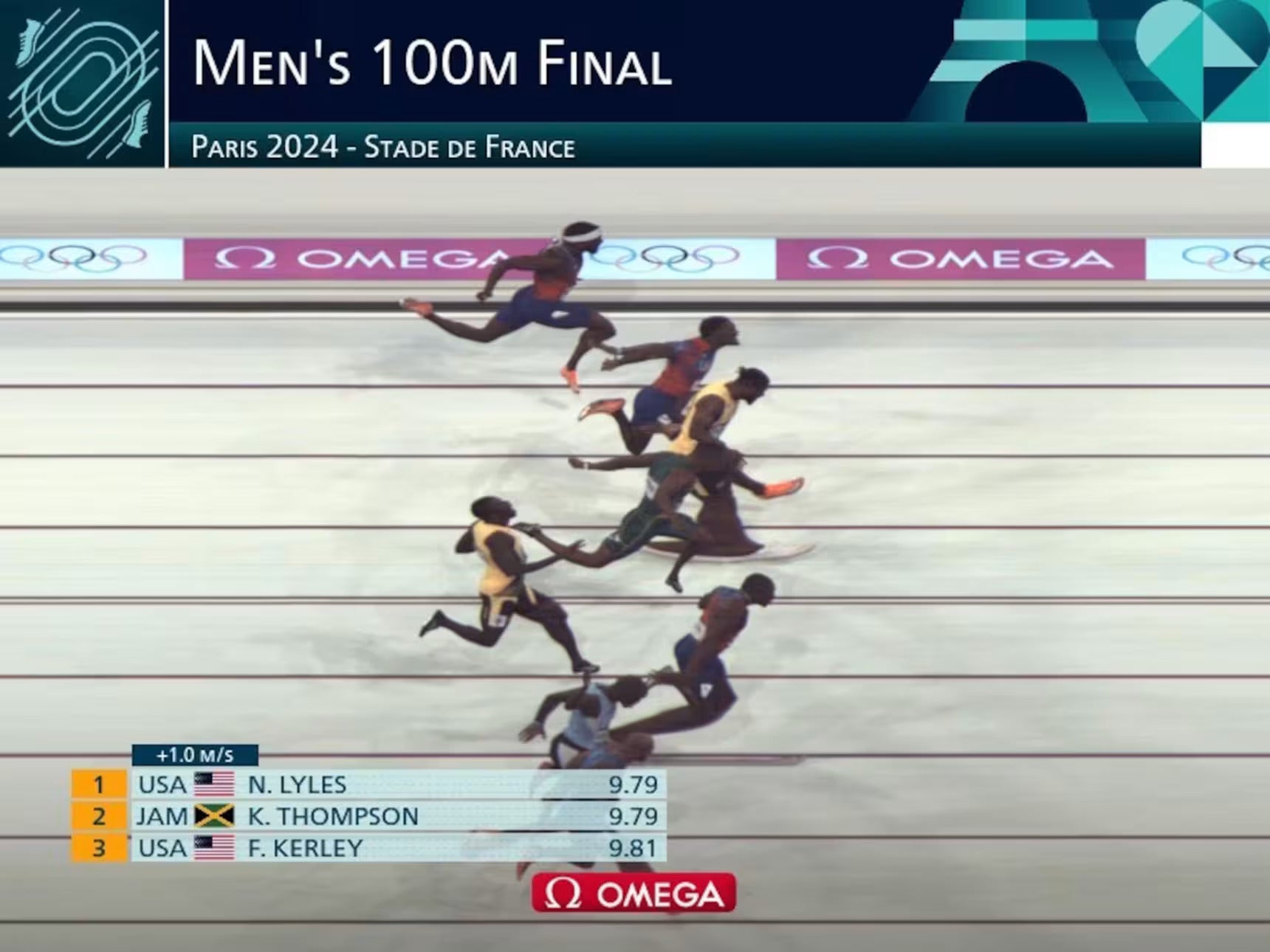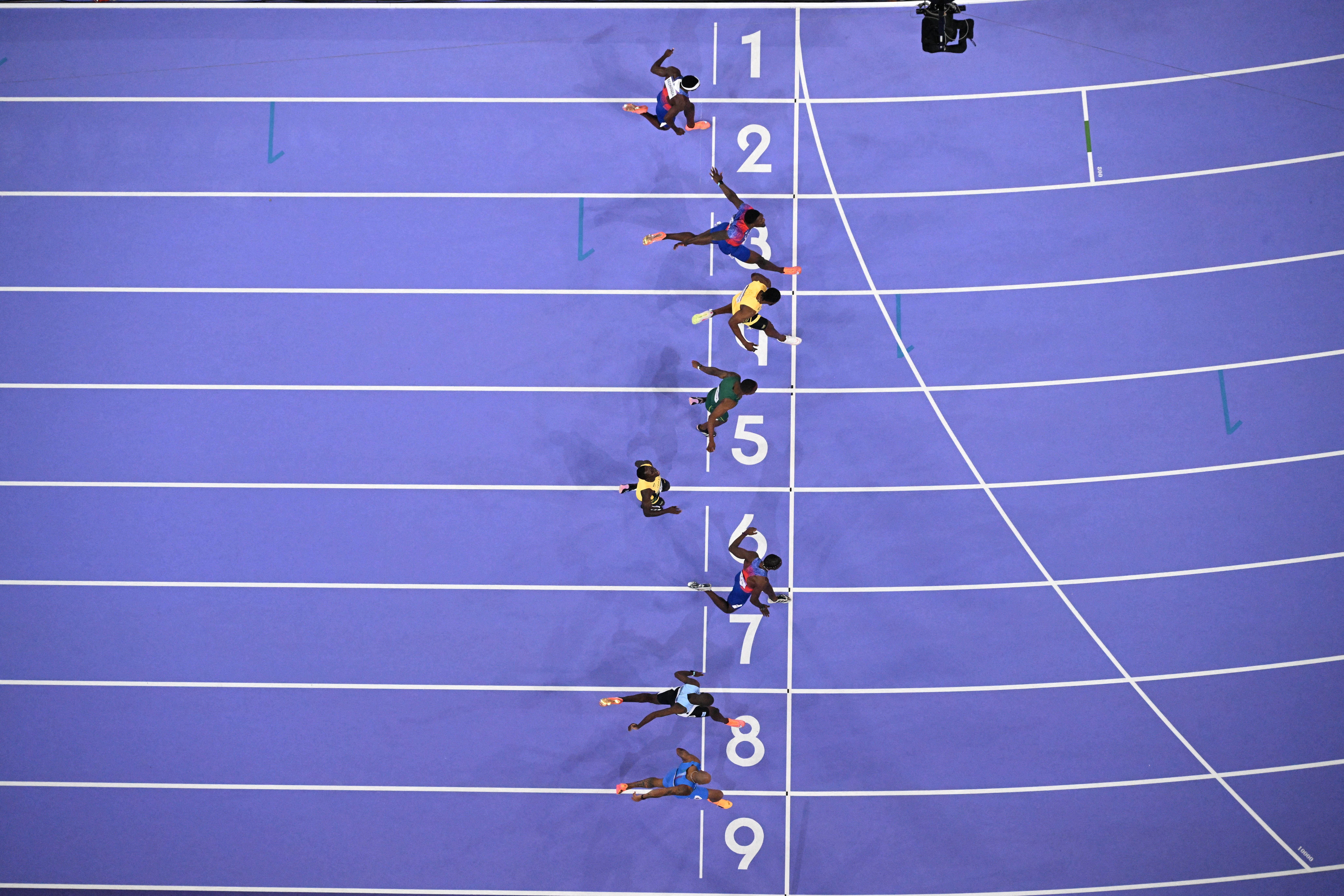Noah Lyles didn’t cross the line first but still won Olympic gold – anatomy of the greatest 100m final
Noah Lyles was last out of the blocks and last with 50 metres to go. He didn’t even cross the line first. So how did the American star win the men’s Olympic 100m final in Paris?

Your support helps us to tell the story
From reproductive rights to climate change to Big Tech, The Independent is on the ground when the story is developing. Whether it's investigating the financials of Elon Musk's pro-Trump PAC or producing our latest documentary, 'The A Word', which shines a light on the American women fighting for reproductive rights, we know how important it is to parse out the facts from the messaging.
At such a critical moment in US history, we need reporters on the ground. Your donation allows us to keep sending journalists to speak to both sides of the story.
The Independent is trusted by Americans across the entire political spectrum. And unlike many other quality news outlets, we choose not to lock Americans out of our reporting and analysis with paywalls. We believe quality journalism should be available to everyone, paid for by those who can afford it.
Your support makes all the difference.By the time Noah Lyles started the Olympic 100m final, he was already last. Lyles took 0.178 sec to react to the gun. That might sound quick but in a sport measured in thousandths of a second, he had just given up 0.07 to one his biggest rivals, fellow American Fred Kerley.
The man Lyles most feared, Jamaica’s Kishane Thompson, was just as sluggish, reacting in 0.176. Yet Thompson is the fastest man this year for a reason. He is a 100m specialist with power and a long stride, and he emerged from his drive phase at 30m with the lead.
By contrast, and despite being the 100m world champion, Lyles is a 200m runner by trade. His strength is in his top speed but he takes a little while to get there, and his slow start has sometimes been an Achilles heel. At 30m he was still dead last, eighth out of eight.
Crucially, though, Lyles was now travelling towards the finish line quicker than anyone else. Between 50m and 60m he made a rapid, stunning climb from eighth to third as he reached his peak speed of the race, 43.6km/hr (27.1mph).

At this point, the leader Thompson (43.2km/hr) and second-place Kerley (43.1km/hr) had already hit their top speeds and were fighting to maintain them. Thompson, running in his first Olympic final, was tensing up, grimacing and straining for the line.
“I wasn’t patient enough with myself to let my speed bring me to the line in the position that I know I could have gone to,” Thompson admitted. “But I have learned from it.”
This is where Lyles came into his element. His speed endurance is his strength, which is why he is such a successful 200m sprinter. He is also an experienced campaigner, having run in Olympic and world finals with memories of both success and failure to call upon. Lyles stayed calm and composed, holding his smooth running style all the way to the line.
That incredible Noah Lyles victory in chart form.
— John Burn-Murdoch (@jburnmurdoch) August 4, 2024
Lyles was in last place until *50m*, and then surged past the field to take it on the line. A blue streak.
Thompson led from 25m to 95m, but not when it counted. pic.twitter.com/TPYr4jYUna
“To be honest, I was like, if I’m running 9.83 in the semi-finals I’m going to be hard to beat,” he said. “I called my therapist and she was like, ‘you need to let go, you need to let it flow’. I was like, ‘alright, I’m going to trust you’.”
He still had one last job to do. The photo finish shows how Lyles’ body is leaning forwards, head dragging the torso through the line with the legs trailing behind. If Lyles’ lean is around 60 degrees from the track, Thompson’s is more like 75.

Technically, Thompson’s right hallux was the first body part to complete this Olympic final. But finish lines only recognise the chest. Lyles won gold by five thousandths of a second, quicker than the time it takes to blink.
“I did think [Thompson] had it at the end,” Lyles admitted. “I went up to him while we were waiting and said ‘I think you’ve got that, good going’, and then my name popped up and I’m like ‘oh my gosh, I’m amazing’.”

He had overcome not only seven rival finalists but the weight of American expectation, delivering Olympic men’s 100m gold for the first time in 20 years, since Justin Gatlin in Athens.
“I had so many commercials going around and so many people, like Snoop Dog is out here, saying that I’m going to be the one. I’m not going to say it’s not pressure, it’s definitely pressure. Saying that the moment is not bigger than me, that the moment was meant for me, constantly saying that it’s going to be the thing I need.”
It was a moment that encapsulated Lyles: drama, entertainment, sheer theatre. Michael Johnson called it the greatest 100m final he had ever seen. “We had this amazing race where you could throw a blanket over the finishing line,” said the American sprint legend. “We didn’t even know who won for a few minutes.”
Join our commenting forum
Join thought-provoking conversations, follow other Independent readers and see their replies
Comments